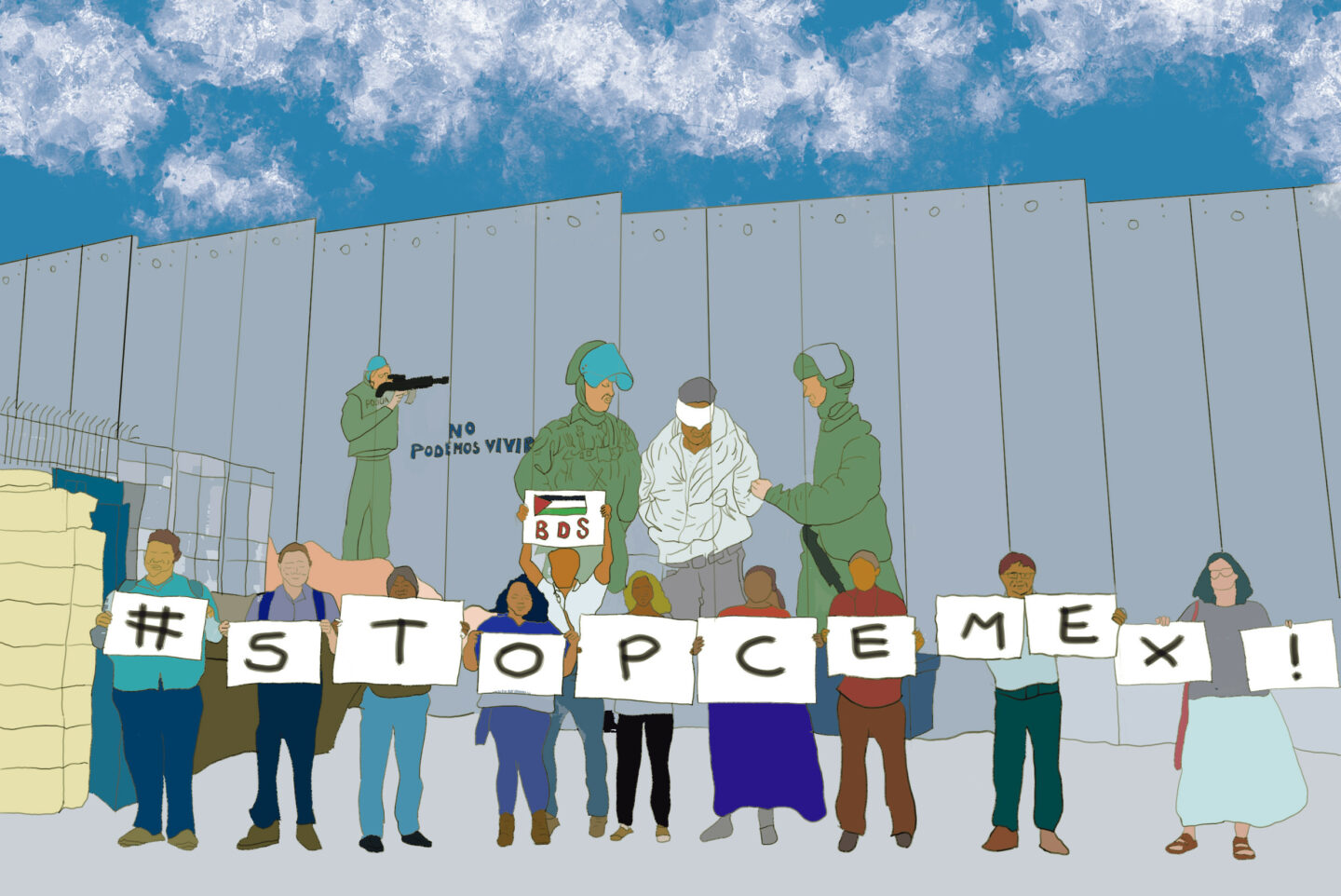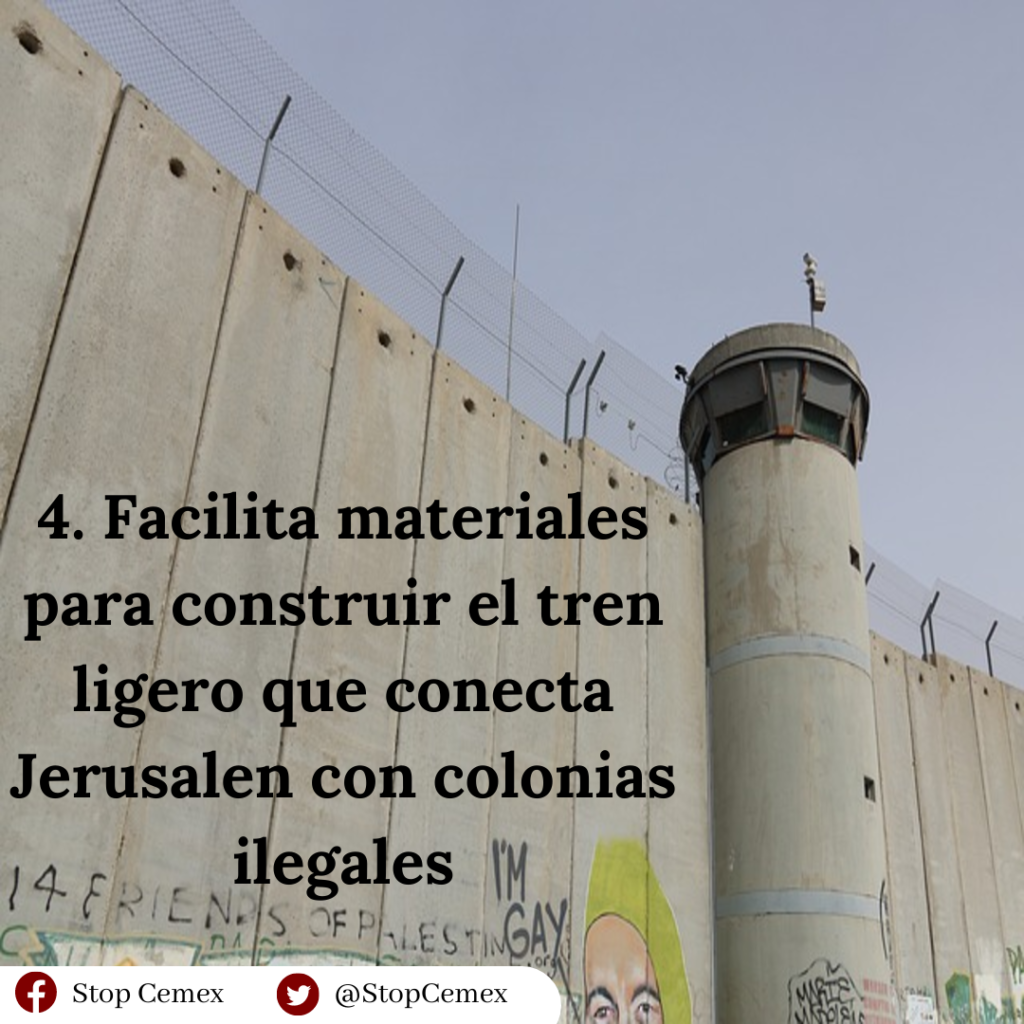Cementando el apartheid
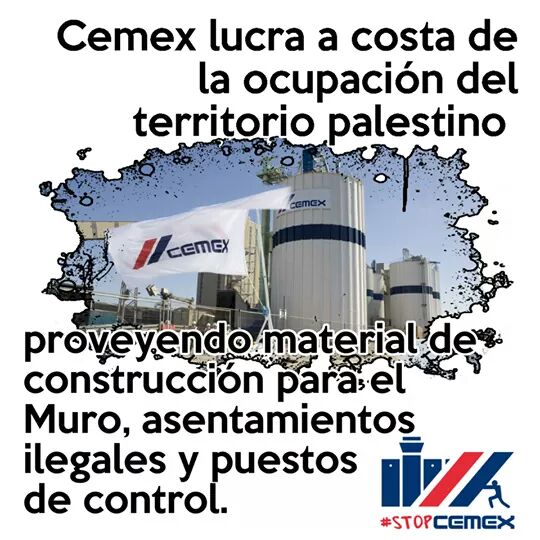
CEMEX es una empresa líder en la producción de materiales de construcción y también una de las compañías mexicanas transnacionales más grandes, con presencia en más de 100 naciones; esto la convierte en una empresa embajadora de México alrededor del mundo.
Desafortunadamente, desde hace décadas CEMEX está involucrada en el mantenimiento y construcción de la ocupación israelí en territorios palestinos y sirios, lucrandose con la construcción del Muro y las colonias israelíes ilegales.
Hoy en día, está jugando un papel clave en la anexión de hecho y de jure de Cisjordania por parte de Israel. Todas las plantas de producción de Cemex están en el territorio que Israel pretende anexar, y el muro de apartheid marca en buena parte el territorio palestino en cisjordania que será anexado. Las colonias israelíes ilegales, de las cuales se lucra Cemex, están ahí para cementar la anexión.
Operaciones de Cemex en territorio palestino ocupado por Israel
Desde 2005, CEMEX es dueña de la israelí Readymix Industries, productora y proveedora de materiales y materia prima para la industria de la construcción. Por medio de esta filial israelí, Cemex ejecuta distintas operaciones ilegales en el territorio palestino ocupado por Israel.
- Tiene plantas de producción en las colonias ilegales, incluidas Mevo Horon, Atarot y Mishor Edomim, zonas industriales ocupadas en Cisjordania, las cuales Israel tiene proyectado anexar, y Katzerin en los Altos del Golan.
- Provee concreto para la construcción de colonias ilegales y puestos de avanzada en Cisjordania.
- Ha proveído concreto para la construcción del muro ilegal israelí en el puente de Gilo de Cisjordania.
- Ha proveído concreto para la construcción del tren ligero en Jerusalén, diseñado para conectar la ciudad de Jerusalén con las colonias ilegales alrededor, el cual es reconocido por violar el derecho internacional.
- Ha proveído concreto para la construcción de retenes militares en Cisjordania, incluidos los de Hawara y Azun-Atma.
- Hasta junio de 2015, Cemex fue co-propietaria de 50% de la cantera de Yatir en Cisjordania, a través de la filial de Readymix, Lime&Stone.
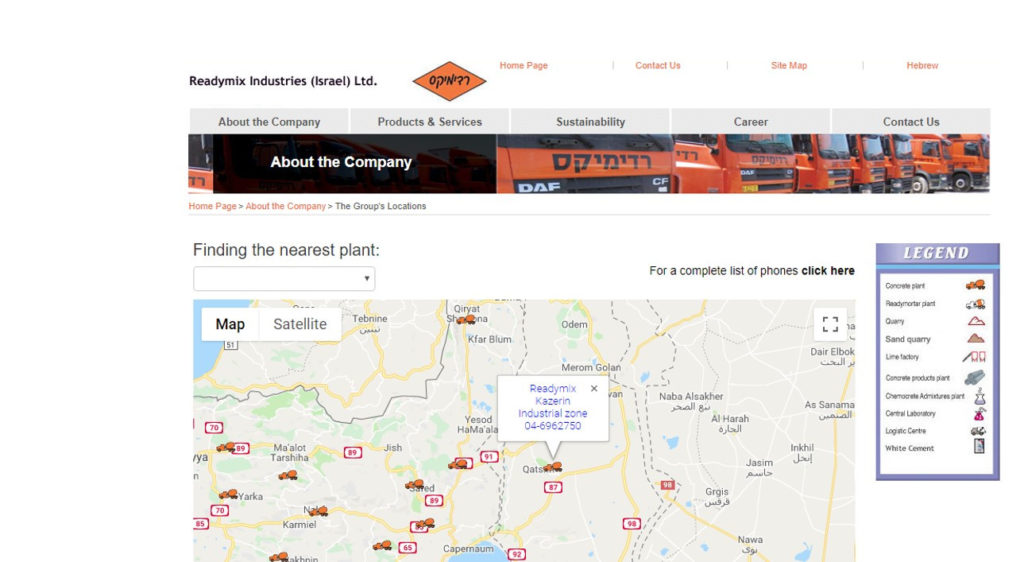
Capturas de pantalla con la ubicación de las plantas de producción, sitio web de Readymix, 21.11.2018 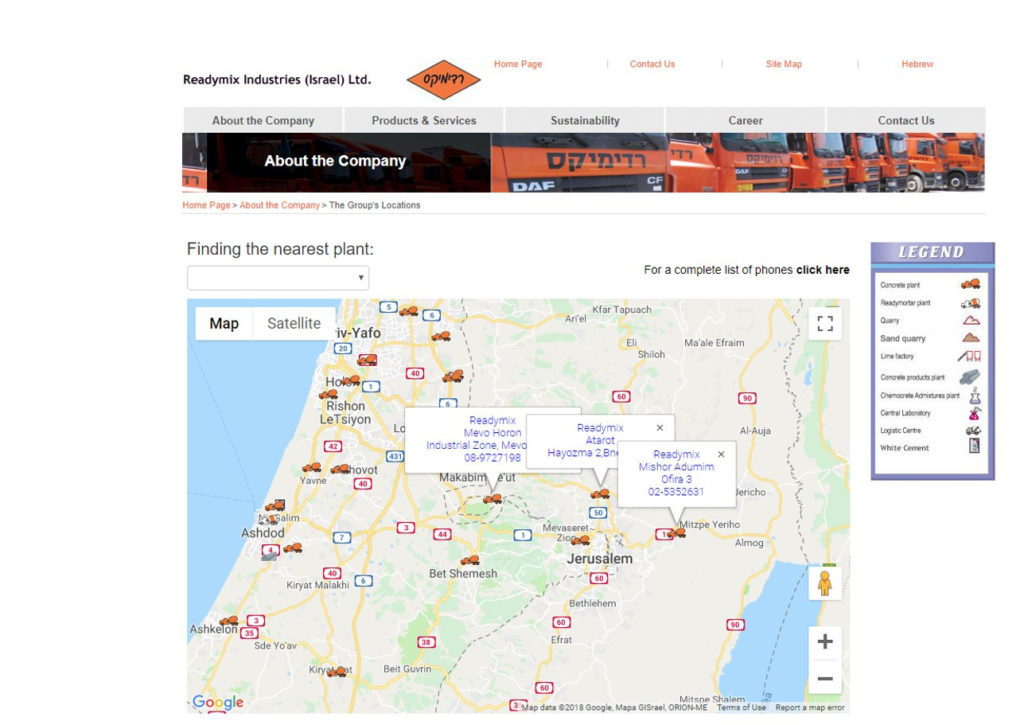
Las actividades de CEMEX en territorio palestino son ilegales
Los asentamientos, el Muro y toda su infraestructura constituyen crímenes de guerra y violaciones a normas internacionales, las cuales Israel está incumpliendo frente a la comunidad global. Por ello todos los Estados deben tomar acciones legales para protegerlas.
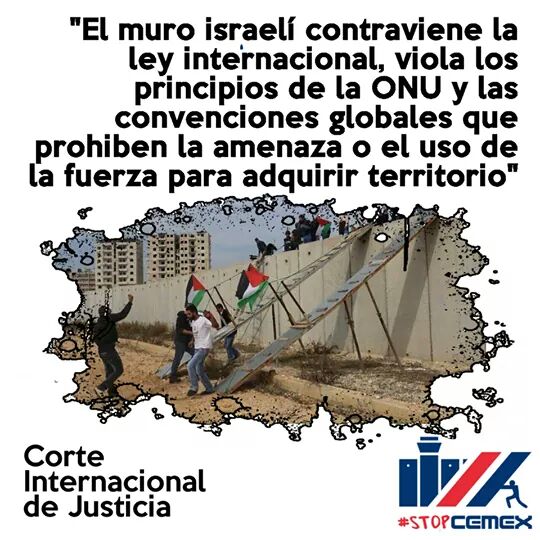
En el 2004, la Corte Internacional de Justicia declaró el Muro ilegal de acuerdo al derecho internacional y recomendó que se derribara. Ese mismo año, la Asamblea General de la ONU adoptó la Resolución ES-10/15, que confirma la ilegalidad del muro y respalda el fallo de la Corte Internacional de Justicia.
Cemex ha insistido que sus operaciones en Territorio Ocupado Palestino no son ilegales, ya que Israel no las considera así. Esta postura es completamente insostenible y ha sido refutada, entre otros, por la organización Abogados por los Derechos Palestinos.
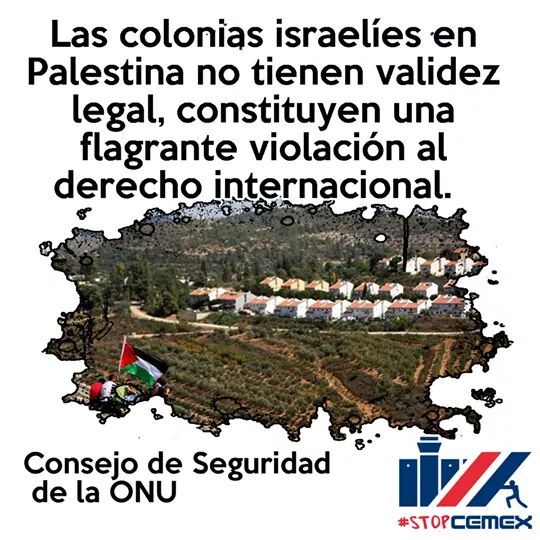
Building the Wall in Palestine
CEMEX is a leading company in the production of construction materials and is one of the largest Mexican multinationals, with presence in more than 100 countries.
Unfortunately, for decades CEMEX has been involved in the maintenance and construction of the Israeli occupation in Palestinian and Syrian territories, profiting off of the construction of the Wall and illegal Israeli settlements.
Cemex Operations in Israeli-Occupied Palestinian Territories
Since 2005, CEMEX has owned the Israeli company Readymix Industries, which produces and supplies materials for the construction industry.
- Has plants in illegal settlements, including Mevo Horon, Atarot, and Mishor Edomim, occupied industrial zones in the West Bank, and Katzerin in the Golan Heights.
- Has provided concrete for the construction Israel’s illegal wall along the Gilo bridge in the occupied West Bank.
- Has provided concrete for the construction of military checkpoints in the West Bank, including the Hawara and Azun-Atma checkpoints.
- Has provided concrete for the construction of the light rail in Jerusalem, which was designed to connect the city of Jerusalem with the illegal settlements around it and which is internationally recognized as violating international law.
- Provides concrete for the construction of illegal settlements and outposts in the West Bank.
- Until June 2015, Cemex was a 50% co-owner of the Yatir quarry through Readymix’s subsidiary Lime&Stone. The Yatir quarry is a mine located south of the Palestinian city of Dhahiriya in the West Bank.
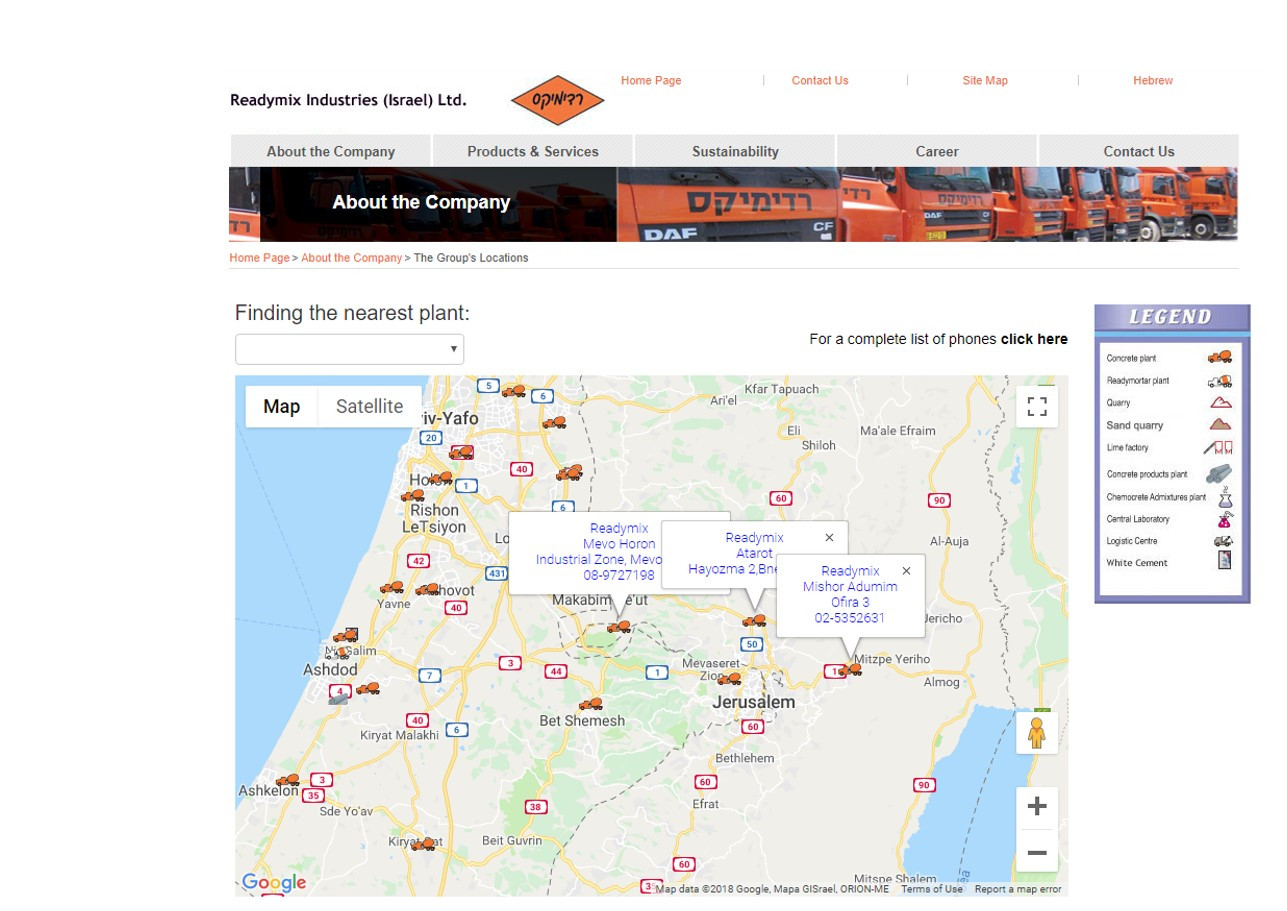
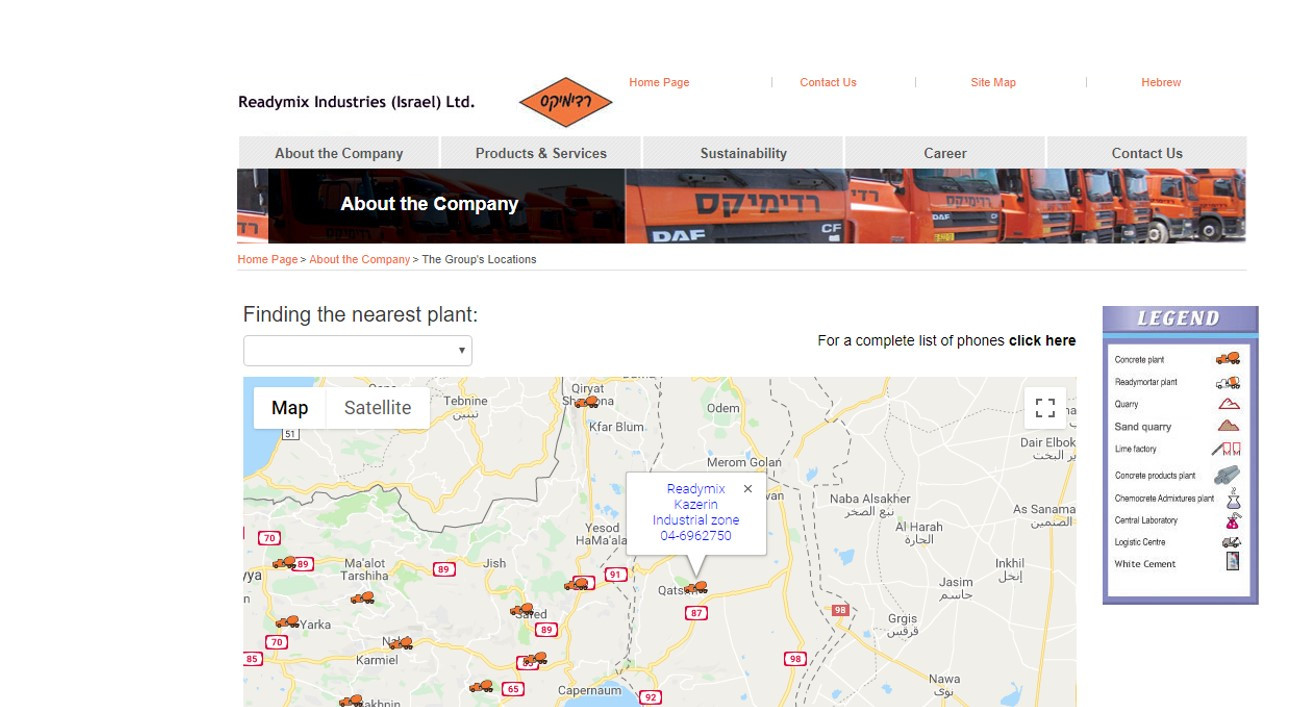
(screenshots with the location of the production plants, Readymix website, November 21, 2018)
CEMEX’s Activities in the Palestinian Territory are Illegal
The settlements, the Wall, and all related infrastructure constitute war crimes and violations of non-derogable, peremptory norms, which are owed by Israel to the entire international community and that all States have a legal duty to protect.
In February 2004, the International Committee of the Red Cross said that the Wall is “a fragrant violation of international humanitarian law.”
On April 15, 2004, the United Nations Human Rights Commission issued a resolution calling on Israel to halt construction of the Wall and demolish the sections already built, in compliance with its obligations as an occupying power under international law.
Three months later, on July 9, 2004, the International Court of Justice issued a landmark opinion stating that the wall being built by Israel in Palestinian territory is illegal, as are the Israeli settlements, and therefore “its construction must be stopped immediately, and Israel must make reparation for all damage caused by the construction of the wall.”
The opinion also states that:
- “All States are under an obligation not to recognize the illegal situation resulting from the construction of the wall and not to render aid or assistance in maintaining the situation created by such construction.”
- “All States parties to the Fourth Geneva Convention have in addition the obligation, while respecting the United Nations Charter and international law, to ensure compliance by Israel with international humanitarian law as embodied in that Convention.”
CEMEX’s activities are not only illegal under international law, but are also illegal according to Mexican law, and the Mexican State has authority over these activities.
Article 1 of the Mexican Constitution establishes that:
“All authorities, within the scope of their powers, must promote, respect, protect, and guarantee human rights in accordance with the principles of universality, interdependence, indivisibility, and progressive realization. Therefore, the State must prevent, investigate, punish, and provide reparations for human rights violations, as established by law.”
